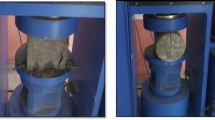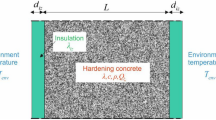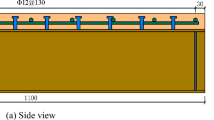Abstract
An overview is given of a global research program performed at Ghent University, concerning early age concrete. More specifically the carly age thermal cracking due to the heat of hydration in hardening massive concrete elements has been focused. A fundamental approach was followed, based on the degree of hydration. By means of the degree of hydration, a fundamental and very accurate description of early age concrete behaviour can be realised. The resulting material laws can be applied within a further study of the durability of massive concrete structures in marine environment. In this way, the fundamental study of early age concrete behaviour can serve as a basis for further durability improvement of concrete structures.
Résumé
Cet article donne l'aperçu d'un programme global de recherche concement le comportement du béton pendant sa phase de durcissement. Plus spécifiquement, on se concentre sur le problème de la fissuration thermique dans le béton jeune, provoquée par la chaleur d'hydratation. Une approche fondamentale est présentée, basée sur le degré d'hydratation. En utilisant ce paramètre, une description fondamentale et précise du comportement du béton jeune peut être réalisée. Les lois de matériau qui en résultent, peuvent être appliquées dans une étude concernant la durabilité des constructions massives en béton situées dans des conditions maritimes. De cette manière, l'étude fondamentale du comportement du béton jeune peut être appliquée afin d'améliorer la durabilité des constructions en béton.
Similar content being viewed by others
References
De Schutter, G. and Taerwe, L., ‘General hydration model for Portland cement and blast furnace slag cement’,Cem. Conc. Res. (3) (1995) 593–604.
De Schutter, G., and Taerwe, L., ‘Specific heat and thermal diffusivity of hardening concrete’,Mag. Conc. Res. 47 (172) (1995) 203–208.
Dechaene, R., De Rouck, J., De Schutter, G., Taerwe, L., Van der Weeën, F. and Van Damme, L., ‘Thermal cracking in hardening concrete armour units’,PIANC Bulletin 82 (1994) 61–69.
De Schutter, G., ‘Hydration and temperature development of concrete made with blast furnace slag cement’.Cem. Conc. Res. 29 (1) (1999) 143–149.
De Schutter, G. and Taerwe, L., ‘Degree of hydration-based description of mechanical properties of early age concrete’,Mater. Struct 29 (1996) 335–344.
De Schutter, G., ‘Extension towards early age concrete of the CEB-FIP Model Code 1990 stress-strain relation for short-term compressive loading’,ACI Mat. J. 96 (1) (1999) 95–100.
De Schutter, G. and Taerwe, L., ‘Fracture energy of concrete at early ages’,Mater. Struct. 30 (1997) 67–71.
De Schutter, G. and Taerwe, L., ‘Towards a more fundamental non-linear basic creep model for early age concrete’,Mag. Conc. Res. 49 (180) (1997) 195–200.
De Schutter, G., ‘Degree of hydration based Kelvin model for the basic creep of early age concrete’,Mater. Struct. 32 (1999) 260–265.
De Schutter, G. and Taerwe, L., ‘Fictitious degee of hydration method for the basic creep of early age concrete’,Mater. Struct. 33 (2000) 370–380.
De Schutter, G. and Taerwe, L., ‘Estimation of early-age thermal cracking tendency of massive concrete elements by means of equivalent thickness’,ACI Mat. J. 93 (1996) 403–408.
De Schutter, G., ‘Quantification of the influence of cracks in concrete structure on carbonation and chloride penetration’,Mag. Conc. Res. 51 (6) (1999) 427–435.
De Schutter, G., ‘Durability of marine concrete structures damaged by early age thermal cracking’, Int. RILEM Workshop on Life Prediction and Aging Management of Concrete Structures, Cannes, Oct. 2000, RILEM Proceedings PRO16 (Ed. D. Naus), 185–194.
De Schutter, G., ‘Influence of hydration reaction on engineering properties of hardening concrete’, to be published.
Author information
Authors and Affiliations
Additional information
Editorial Note Prof. De Schutter presented a lecture of this paper at the 2001 RILEM Annual Meeting in Stuttgart, as he was awarded the 2001 Robert L'Hermite Medal in recognition of his comprehensive and encompassing research work on the behaviour of concrete at early age. Geert De Schutter is a RILEM Senior Member. He participates in the work of RILEM TC 181-EAS (‘Early age shrinkage induced stresses and cracking in cementitious systems’).
Rights and permissions
About this article
Cite this article
De Schutter, G. Fundamental study of early age concrete behaviour as a basis for durable concrete structures. Mat. Struct. 35, 15–21 (2002). https://doi.org/10.1007/BF02482085
Received:
Accepted:
Issue Date:
DOI: https://doi.org/10.1007/BF02482085




